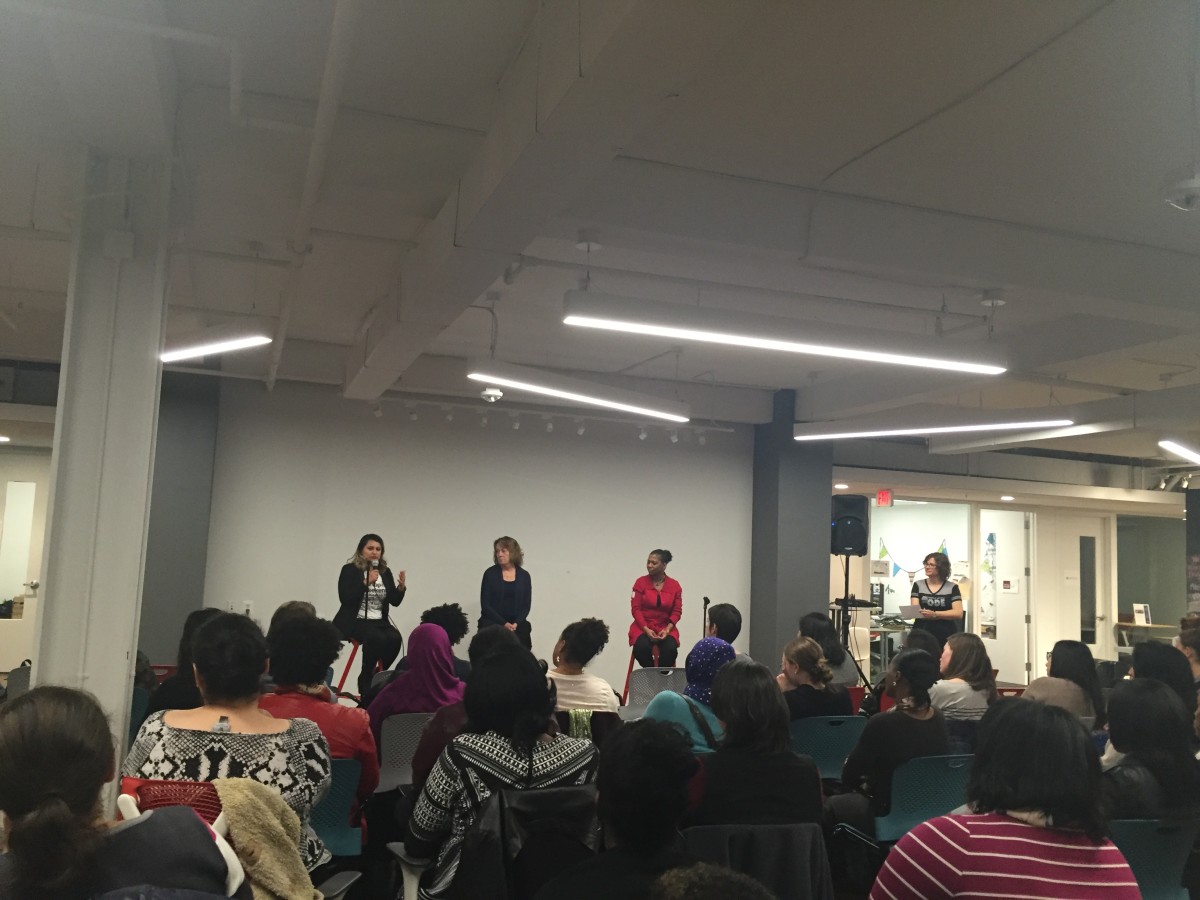Women Who Code DC, the District-based branch of the global nonprofit community, is a powerhouse in providing resources and opportunities for women working in the D.C. tech field. The group organizes four skills-centered meetup groups every week, hosts active Slack channels with the goal of answering questions and providing community, provides “virtual office hours” with professionals who have donated their time and offers tech talks for an in-depth look at various subjects.
You get the idea. So it seemed a natural fit when the group announced the launch of a mentorship program. On Sunday evening a room full of women who code (and just a few men) gathered at ImpactHub DC to mark the official launch with discussion of what mentorship is and how it can help women navigate a difficult industry.
The tone of the event was decidedly personal — a reminder that, in a room dominated by women, statistics on how women and minorities fare in the tech workplace are not just statistics.
Lucy Sanders, the CEO and founder of the National Center for Women and Information Technology (NCWiT), led the evening with a keynote. She not only set the scene with a description of the problem, but also dove into explaining the definitions and capacities of mentorship. Women Who Code DC will be using the mentoring-in-a-box materials produced by NCWiT for its mentoring program.
But Sanders’ talk wasn’t only a high-level look at the issue — she also took the time to tell personal stories. Stories about the teachers who helped her figure out her strengths, the bosses who helped her get and keep jobs, and the bits of career advice she got along the way.
After the keynote, Sanders was joined by Lilibeth Gangas, an innovation strategist at Booz Allen Hamilton, and Shireen Mitchell, the Director of Web & Interactive Media at the Women’s Media Center (WMC) and founder of Digital Sisters (DS) for a panel discussion.

The panel speaks to the crowd gathered at the Women Who Code DC Mentoring Program launch. (Photo by Tajha Chappellet-Lanier)
Here the personal stories continued — stories of hardship and perseverance and mentors found in unexpected places.
However, for all the stories of mentoring success, there was a somber note of warning as well. As Sanders put it “mentors are necessary but not sufficient” to fix the statistics on underrepresented groups in tech. For the women already in the room on Sunday night, mentors can help navigate the maze that is a career in tech. But what about the young women who were not yet in the room?
The panelists agreed that systematic change is needed, but that, as individuals, we need to start somewhere. And offering, supporting, promoting and celebrating mentoring provides one such place to start.
So what will the Women Who Code DC Mentoring Program look like moving forward? The program seems to be more of a commitment to bringing the issue of mentoring into the spotlight than anything else. Women Who Code DC has stated that the goal is not specifically to match mentors with those needing mentorship, but rather to empower women in D.C. tech to find their own mentors.
Be sure to keep tabs on how this program grows.
Before you go...
Please consider supporting Technical.ly to keep our independent journalism strong. Unlike most business-focused media outlets, we don’t have a paywall. Instead, we count on your personal and organizational support.
3 ways to support our work:- Contribute to the Journalism Fund. Charitable giving ensures our information remains free and accessible for residents to discover workforce programs and entrepreneurship pathways. This includes philanthropic grants and individual tax-deductible donations from readers like you.
- Use our Preferred Partners. Our directory of vetted providers offers high-quality recommendations for services our readers need, and each referral supports our journalism.
- Use our services. If you need entrepreneurs and tech leaders to buy your services, are seeking technologists to hire or want more professionals to know about your ecosystem, Technical.ly has the biggest and most engaged audience in the mid-Atlantic. We help companies tell their stories and answer big questions to meet and serve our community.
Join our growing Slack community
Join 5,000 tech professionals and entrepreneurs in our community Slack today!

The person charged in the UnitedHealthcare CEO shooting had a ton of tech connections

Northern Virginia defense contractor acquires aerospace startup in $4B deal

From rejection to innovation: How I built a tool to beat AI hiring algorithms at their own game


